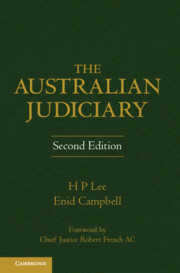Book contents
- Frontmatter
- Contents
- Preface
- Acknowledgments
- Table of Cases
- Table of Statutes
- Chapter 1 Introduction
- Chapter 2 The courts and judges
- Chapter 3 The judiciary as a branch of government
- Chapter 4 Appointment and conditions of service
- Chapter 5 Removal, suspension and discipline of judges
- Chapter 6 Judicial conduct
- Chapter 7 Extra-judicial activities of judges
- Chapter 8 Protecting judicial institutions
- Chapter 9 The accountability of judges
- Chapter 10 A public trust
- Appendix 1 Judicial statistics tables
- Guide to Judicial Conduct
- Index
- References
Chapter 9 - The accountability of judges
Published online by Cambridge University Press: 05 December 2012
- Frontmatter
- Contents
- Preface
- Acknowledgments
- Table of Cases
- Table of Statutes
- Chapter 1 Introduction
- Chapter 2 The courts and judges
- Chapter 3 The judiciary as a branch of government
- Chapter 4 Appointment and conditions of service
- Chapter 5 Removal, suspension and discipline of judges
- Chapter 6 Judicial conduct
- Chapter 7 Extra-judicial activities of judges
- Chapter 8 Protecting judicial institutions
- Chapter 9 The accountability of judges
- Chapter 10 A public trust
- Appendix 1 Judicial statistics tables
- Guide to Judicial Conduct
- Index
- References
Summary
The concept of accountability
In 1995, an English judge, Lord Taylor of Gosforth, observed that the term ‘accountability has become one of the buzzwords of the age’. It is a term often used interchangeably with several other words and phrases, such as ‘being answerable’, ‘responsibility’ and being the ‘subject of scrutiny’. Lord Taylor’s observation was made in the context of general remarks on what some had perceived to be a lack or insufficiency of accountability on the part of members of the judicial branch of government. In recent times, several Australian judges have found occasion to speak or write about the same subject.
One can only speculate on why there have been charges of lack of appropriate judicial accountability. Sometimes the charges may have been generated by widely publicised episodes involving official inquiries into the conduct of individual judges, sometimes by judicial decisions which have re-shaped the law. Critics of such decisions may allege that it was wrong for the judges to have decided as they did, in that they exceeded their limited law-making functions and trespassed into a domain reserved for an elected legislature whose members are accountable to electors. Concerns about judicial accountability may even have been spawned by increased awareness among members of the general public about the operations of the courts. Chief Justice Doyle of the Supreme Court of South Australia seems to have recognised this possibility when he observed:
There is a greater public awareness that judges suffer from the normal human frailties. This is a time in which there are high public expectations of government and of the professions, and the public are, as we all know, highly and rightly critical when acceptable standards are not met.
There is nothing wrong with the notion that judges should be accountable. As Justice McGarvie pointed out, ‘[i]n a good democracy, power is never exercised without accountability for it’. But if judges are to be held accountable, one needs to ask to whom are they accountable, for what and in what ways? There is the further question of what can and should be done when judicial accounting is found to be unsatisfactory.
- Type
- Chapter
- Information
- The Australian Judiciary , pp. 249 - 307Publisher: Cambridge University PressPrint publication year: 2012



